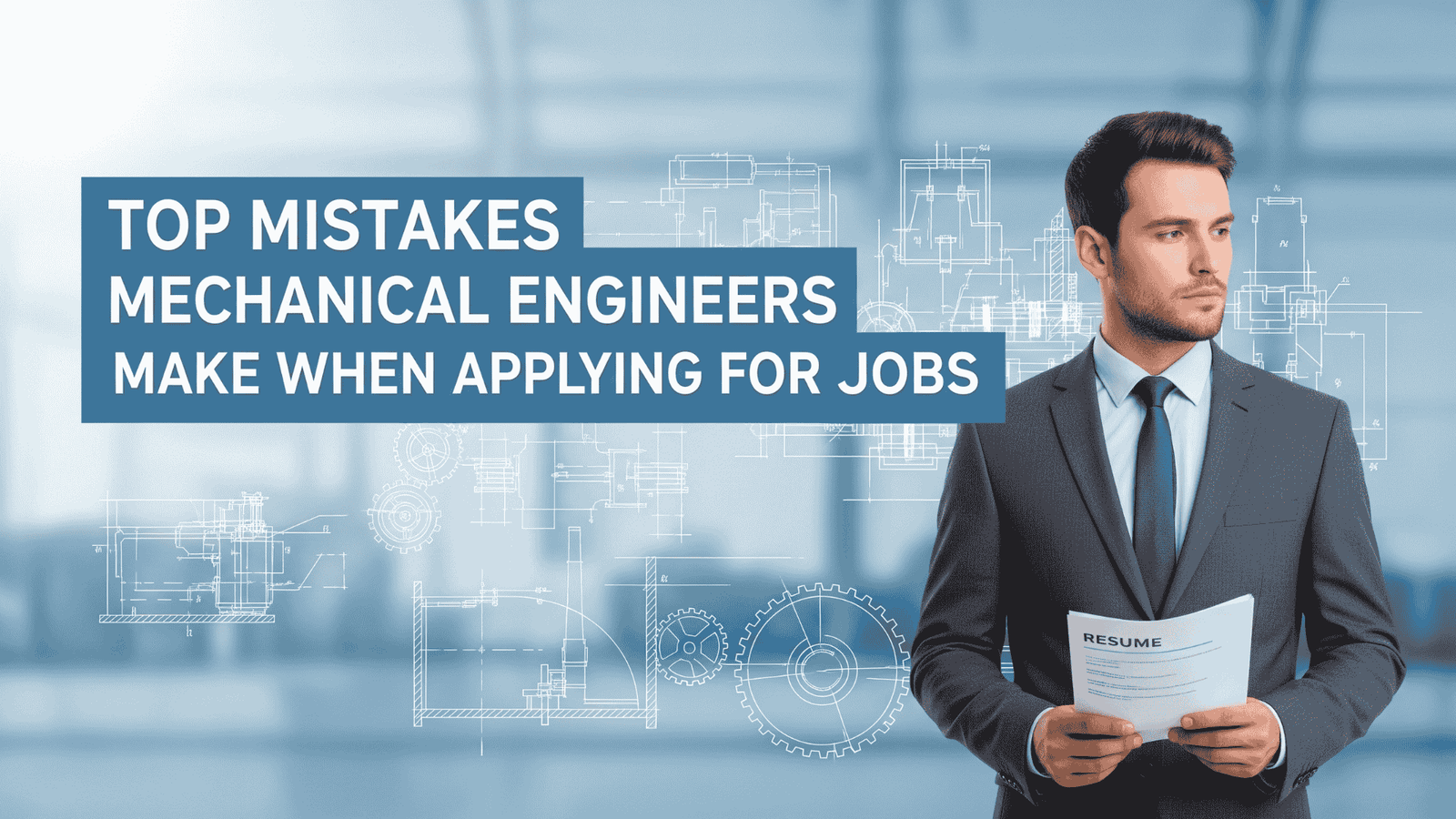
Mechanical engineering is one of the most rewarding careers in India and across the world. From designing machines and automotive parts to working in aerospace, manufacturing, and energy sectors, mechanical engineers have a wide range of career paths.
But here’s the reality – even though there are thousands of mechanical engineer jobs, many freshers and even experienced engineers struggle to get selected. The reason is not always lack of skill. Most of the time, it is because of simple yet serious mistakes in the way they apply for jobs, prepare resumes, or attend interviews.
In this guide, we will discuss the top mistakes mechanical engineers make when applying for jobs and how to avoid them.
One of the biggest mistakes is sending the same resume to every company. Recruiters can easily see when a resume is copy-paste and not tailored for the role.

Highlight the skills and projects that match the job description.
For mechanical design jobs, mention CAD software like AutoCAD, SolidWorks, CATIA, Creo, NX, and Ansys.
Add internship experiences and academic projects that show practical knowledge.
Remember, a resume is not just a document – it is your first impression.
Mechanical engineering is a broad field. Many students apply to jobs without focusing on a specific domain.
Example: A company working in automotive design will prefer a candidate who knows BIW design, GD&T, and jigs and fixtures rather than someone who has only basic CAD knowledge.

Decide your domain early – automotive, aerospace, material handling, HVAC, or manufacturing.
Take domain-based mechanical design training to improve your chances.
Show specialization in your resume and portfolio.
Domain knowledge sets you apart from the competition.
Even if you have good skills, a poorly formatted resume can get rejected. Many mechanical engineers make the mistake of:
Using long paragraphs instead of bullet points.
Not including keywords like mechanical design engineer, CAD design, or product development.
Forgetting to add contact details or LinkedIn profile.

Use a clean, professional resume format.
Highlight skills, tools, certifications, and projects.
Keep it 1–2 pages maximum.
Recruiters spend only 6–8 seconds scanning a resume – make sure yours stands out.
Many mechanical engineers only rely on their resume, but companies want to see real proof of skills.

Create a portfolio of CAD models (AutoCAD, CATIA, SolidWorks, etc.).
Upload projects on LinkedIn, GitHub, or personal website.
Show academic projects with diagrams and working explanations.
A strong portfolio increases your chances of getting shortlisted.
Another common mistake is applying to every job blindly. Many engineers do not research the company or the role.

Read the job description carefully.
Understand what skills the company is looking for.
Research the company’s products, services, and projects before applying.
This shows seriousness and improves your interview confidence.
Even skilled engineers fail interviews because they don’t prepare well. Mistakes include:
Weak answers to common questions like “Tell me about yourself”.
Lack of knowledge about mechanical design basics, GD&T, or material selection.
Not practicing technical problem-solving questions.

Practice both technical and HR interview questions.
Revise core subjects like Strength of Materials, Thermodynamics, and Machine Design.
Be ready to explain your projects in simple words.
Preparation is the key to confidence.
Many engineers focus only on technical skills and ignore communication. But companies expect engineers to explain designs, present ideas, and work in teams.

Improve spoken English and presentation skills.
Practice explaining complex concepts in simple terms.
Join mock interview sessions or group discussions.
Good communication makes you a more valuable candidate.
In today’s industry, CAD and simulation software are must-have skills. But many candidates just write “AutoCAD, SolidWorks” in their resume without showing depth.

Mention specific skills like 3D modeling, assembly, drafting, GD&T applications, stress analysis.
Highlight certifications in AutoCAD, CATIA, Creo, NX, or Ansys.
If you have completed live projects in software, mention them clearly.
This builds credibility and confidence for recruiters.
Some engineers apply to jobs without checking location requirements. They later decline offers because of relocation issues. This creates a negative impression.

Be clear about your job location preferences.
If you are applying for mechanical jobs in Pune, mention willingness to work in nearby areas like Pimpri-Chinchwad, Hinjewadi, or Chakan (industrial hubs).
Show flexibility if possible, but avoid applying where you won’t relocate.
Many engineers apply once and never follow up. This reduces chances of being noticed.

Send a polite follow-up email after 1–2 weeks.
Connect with HR on LinkedIn and show interest.
Attend walk-ins and job fairs actively.
Persistence shows dedication.
Both extremes are mistakes. Some engineers act overconfident, while others show low confidence in interviews.

Maintain a balance – be confident but humble.
Back your answers with examples or project experiences.
Admit if you don’t know something but show willingness to learn.
Many freshers rely only on job portals. But networking plays a huge role in mechanical jobs.

Join LinkedIn groups related to mechanical design and CAD engineering.
Connect with alumni, professors, and industry professionals.
Attend seminars, workshops, and training programs.
Strong networking opens hidden job opportunities.
Getting a mechanical engineering job is not just about having a degree. It is about avoiding common mistakes and presenting yourself as the right candidate.
To summarize, the top mistakes mechanical engineers make when applying for jobs are:
Generic resumes
Ignoring domain-specific skills
Poor resume formatting
No project portfolio
Lack of research
Weak interview preparation
Poor communication skills
Not showing software proficiency
Ignoring job location
No follow-up
Confidence imbalance
No networking
By avoiding these mistakes, you can improve your chances of landing your dream mechanical design job.

Take the next step in your career today – because the right preparation leads to the right job.
© 2025 4Dimensions Infotech. All rights reserved. | Best Design Engineering Training Institute in Pune
Start your journey with the best design engineering training institute in Pune.